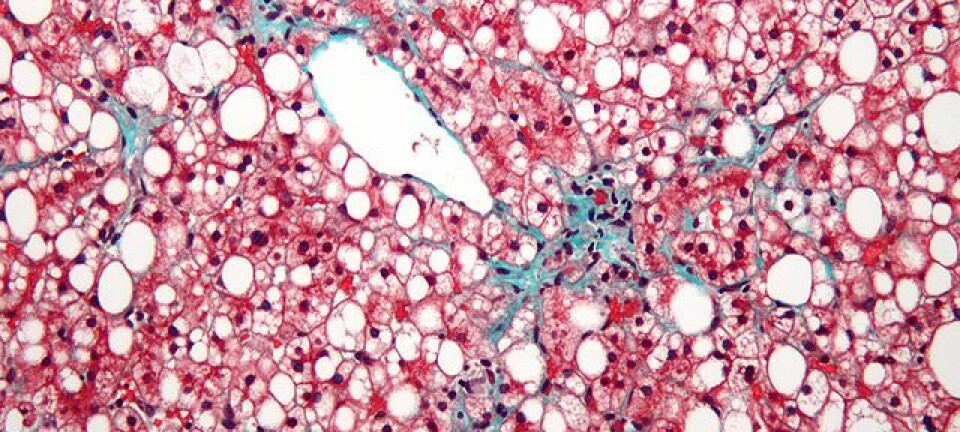Few really boost health with alcohol
Only about 15 percent of the population can use their health as an excuse for enjoying a couple of glasses of red wine daily.
Denne artikkelen er over ti år gammel og kan inneholde utdatert informasjon.
Norwegian and Swedish researchers think they have found an explanation for why alcohol can protect against coronary heart disease.
The study might chill the blood of many red wine connoisseurs.
On the one hand it reconfirms what hundreds of other studies have shown – solid indications that a moderate intake of alcohol can provide protection against heart attacks.
But unfortunately the study found this only applies to a fraction of the population. In our part of the world, that adds up to 15 percent of us.
Too wide-sweeping

The Norwegian professor Dag S. Thelle partook in the research project at the University of Gothenburg. He asserts that the advice given time and again in magazines and newspapers – and sometimes by family MDs – is too general by a long shot.
“This probably means that what we’ve heard for so many years, that alcohol is good for the heart, only applies to a few of us,” he says.
Heredity and environment
The researchers at the University of Gothenburg have looked at the interaction among environmental factors and genetics with regard to disease.
A French study from 1995 initially indicated that people who have a special human genotype can enjoy a protective benefit from alcohol.
The Swedish research set out to test 618 coronary heart disease patients with around 3,000 control persons in Western Sweden. These were grouped in accordance with how much alcohol they reported drinking per week, including none at all. They were also submitted to genetic tests to see whether they had the particular genotype.
The analysis of the data, which is now being published in the journal Alcohol, confirms what the French medical researchers discovered twenty years ago. People who have this genotype and drink moderate amounts of alcohol are much less prone to have heart problems than others.
“On its own the gene has no significance for disease. But combined with alcohol it gives a strong protection against heart attacks,” says Thelle.
Affects good cholesterol
Cholesterol can be grouped into the beneficial type HDL and the bad type LDL. HDL helps remove bad cholesterol from places where it doesn’t belong.
The gene investigated by the researchers creates cholesteryl ester transfer protein (CETP), which in turn has an effect on the good HDL cholesterol.
HDL cholesterol protects against hardened arteries and takes excess fats out of the circulatory system and into the liver, where it is dealt with.
Lots of studies have shown that alcohol has an impact on HDL cholesterol. So HDL has been the logical candidate when medical researchers have tried to explain how alcohol can protect against infarcts.
An alternative explanation has been that antioxidants in grape skins are responsible for the favourable effect.
Thelle thinks both of these can be correct. But no one has explained how HDL or antioxidants really work against coronary heart disease.
“In our study we see that the salutary effect of alcohol occurs first when a person has a particular variety of this gene. We don’t understand well enough how the mechanism works,” says Thelle.
Discovery of HDL cholesterol
Thelle was a member of the group that discovered the helpful HDL cholesterol in the 1970s.
He conducted research in Tromsø and was strongly involved with the beginning of the Tromsø Study in 1974. The cohort study was launched to combat the high mortality of cardiovascular diseases in Norway.
In 1977 the research group he was a member of published a pioneering article in the The Lancet which described the impact of HDL.
“This was a little study from a university which was not very noticeable on the scientific maps. It was quite an event when the article was published,” he says.
Since then, tens of thousands of articles have been produced about HDL cholesterol. But scientists still don’t really understand how it works.
A little alcohol
A new trail-blazing report was released in 1979 just two years after the Tromsø researchers published their study of cholesterol. It was by the British researchers A.S. St. Leger and A. L Cochrane.
They showed for the first time that countries with high wine consumption had populations with lower risks of death due to coronary heart disease.
This triggered thousands of studies on the subject. Most of the results pointed in the same direction – moderate intakes of alcohol do provide protection against heart attacks.
The link emerges
In the course of the 1980s the connection between alcohol and HDL cholesterol started to emerge in scientific publications.
Thus there are two protective factors. This opened doors to innumerable new studies – and to scientific debate.
Some studies have shown that the protective effect of alcohol came from HDL cholesterol. Others claimed that the favourable effect of HDL is independent of alcohol.
A third position was that alcohol is simply a disturbing factor that has no role at all in this context. If researchers find a link it is because people who drink a couple of glasses of wine a day live healthier lives in other ways than your average teetotaller.
DNA analysis opened a new world
A new world opened up in the 1990s when scientists started conducting advanced genetic analyses.
This is when the French medical researchers found the CETP genotype and discovered that patients who had it attained more protection from alcohol.
“It’s vital for us to repeat such research,” says Thelle. He thinks that even though the Swedish-based study has now revealed much of the same as the French one did in 1995, it’s important for such findings to be verified in other studies to ensure the right factors are involved.
In any case, he thinks it is time to stop repeating the pervading advice that a glass of wine or two a day is good for the heart.
------------
Read the Norwegian version of this article at forskning.no
Translated by: Glenn Ostling



































